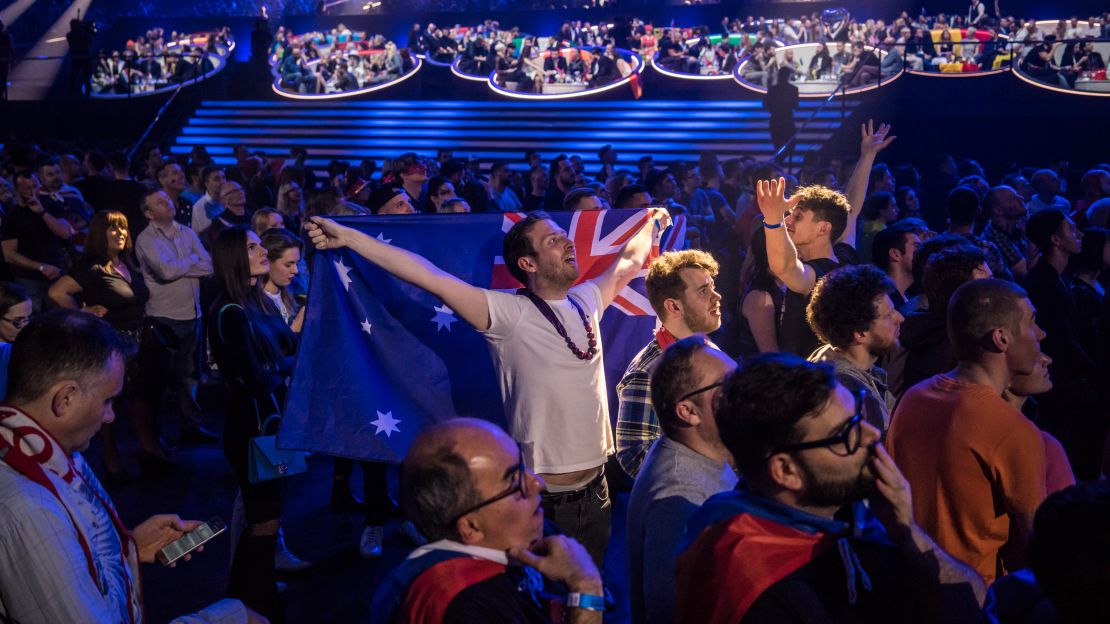Story highlights
26 countries are competing in the final of Eurovision 2018 on Saturday
A study suggests that when a nation takes part, its population has a 13% chance of higher "life satisfaction"
On Saturday, 26 countries stand to be a lot happier – simply by taking part in an iconic singing competition.
All are competing in the final of Eurovision 2018, also known as the Eurovision Song Contest, a flamboyant international TV competition that has been running since 1956.
Such is the popularity of the contest, held this year in Lisbon, Portugal, that participant countries now come from Israel and Australia. It is broadcast to millions of people in countries that don’t compete, such as the United States, Canada, New Zealand and China.

Now, there may be reason for more countries to participate.
A new study suggests that when a nation takes part in Eurovision, it has a 13% chance of higher “life satisfaction” among its population compared with those who don’t.
This life satisfaction may in turn benefit their physical and mental health, according Filippos Filippidis, an epidemiologist in public health at Imperial College London, who led the study published Friday in the journal BMC Public Health.
His team found that people were 4% more likely to be satisfied with their life for every increase of 10 places on the final score board – for example, if their country finished second rather than 12th.

However, doing badly in the contest was also associated with a greater increase in life satisfaction compared with not taking part at all. So, achieving “nul points” – a zero score – is not so bad after all.
The research backs up studies showing that hosting or succeeding in sporting fixtures like the US Super Bowl and the football World Cup can boost a city or nation’s well-being and productivity.
One US study found that making the playoffs or finals in professional sporting events related to a decline in suicide in 30 US metropolitan areas between 1971 and 1990, while another found increased productivity in the city of the winning Super Bowl team.
Another study of the Olympic Games, the FIFA World Cup and the UEFA European Championship found that the “feel-good” factor associated with hosting football events is large and significant, although an effect on happiness was not found.
Ireland must have been particularly happy in the 1990s, when it won the contest seven times.
Previous high-profile wins include Swedish supergroup ABBA, who took the crown in 1974 with “Waterloo”; Bucks Fizz, who won for the UK with “Making Your Mind Up” in 1981; and Céline Dion, who won in 1988 for Switzerland.

But David Spiegelhalter, the Winton Professor for the Public Understanding of Risk at Cambridge University, said that although it may be interesting to think of reasons for this association, he would be very skeptical of there being a causal link between the two. He was not involved in the new study.
Filippidis said more research was needed to confirm the association but added that the work showed the importance of considering the unintended consequences of events that reach a wide audience.
His team – from competing countries Greece, Italy, Ireland, Australia and the UK – is usually researching the effect of public policies, environmental factors and economic conditions on people’s lifestyle and health.
But last year, during the competition, they began discussing whether it could also affect a country’s national well-being and decided to investigate.

They collected data from the Eurobarometer survey, which included answers from over 160,000 people from 33 European countries to a question on life satisfaction taken just after the finals of the contest between 2009 and 2015. They also analyzed each country’s performance in the contest, ranking those at 20th place or below as “terrible.”
Winning was not associated with improved life satisfaction, but the higher the ranking per 10 places, the higher the odds of being “very satisfied.”

The scientists also compared data from countries that participated but did badly with those that didn’t take part at all. They found that taking part but finishing near the bottom of the table was associated with a 13% higher chance of life satisfaction compared with not taking part in the competition.
Filippidis said the results surprised him. “I thought there may be something there, but the results were quite consistent across countries.
“If England win the football World Cup, even if you are not interested in football, you will see that other people are happy talking about it and smiling. Being happy is contagious, and it can be the same for misery and bad moods.”
Professor Mike Berry, consultant clinical forensic psychologist at Birmingham City University, wasn’t involved in the study but described the work as “a really interesting, amusing and well-designed study.”
He added that although it did not show causation, the link with greater satisfaction sounded “feasible.” However, he said the problem was that the effect was fleeting.
“There was a marked increase in attendance and productivity during the 1966 World Cup soccer finals in England, which England won,” he explained. “Workers attended factories every day, so they could talk about the various games.”
Join the conversation
Berry was also not surprised that winning was not the important part. “We just had the end of the Championship football last weekend. The teams and their fans avoiding last-minute relegation were often happier than the team that actually was promoted.”
In the UK, he said, the next event hat may impact the nation’s satisfaction was next week’s marriage of Prince Harry to Meghan Markle.
“For a few days, there will be a major increase in public mood, but more worrying the number of babies born nine months later and being named Harry or Meghan.”
















